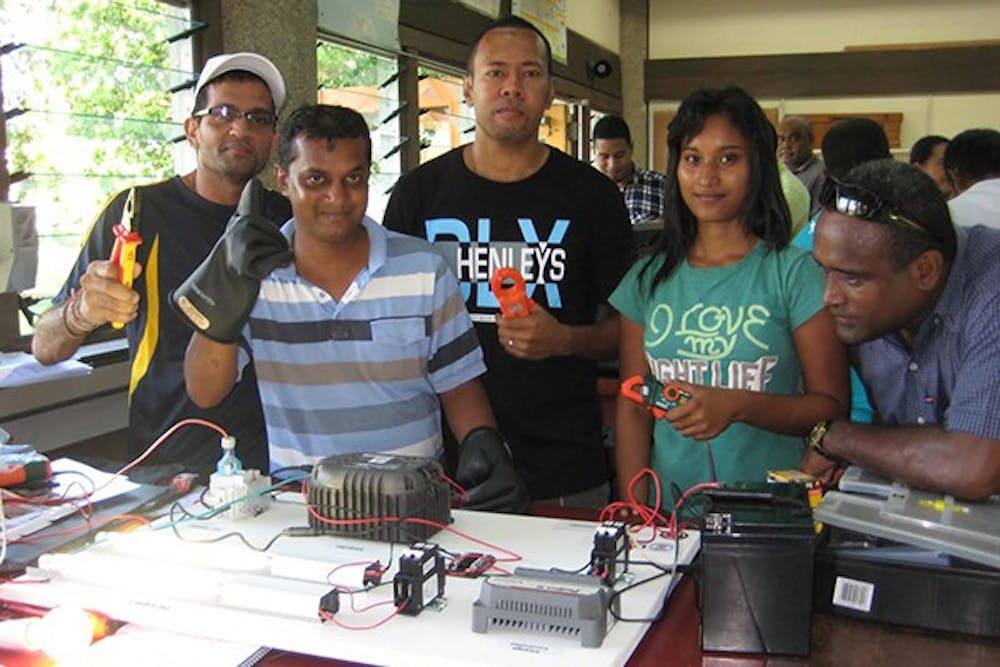 (Photo Courtesy of Bulent Bicer)
(Photo Courtesy of Bulent Bicer)
ASU College of Technology and Innovation faculty members are partnering with the International Renewable Energy Agency to further the development of renewable solar photovoltaic energy systems certification programs in West African countries.
Bulent Bicer, project manager in the College of Technology and Innovation, said solar energy is important to the world because, for at least the next few billion or so years, the sun will provide the people of the world with clean energy.
Solar photovoltaics are basically an energy transfer from solar energy, or light, which are called photons. Photons have certain wavelengths. The eye sees the visible spectrum, but the whole light spectrum itself is much larger.
Photovoltaics take the energy of the photons and turn them into electrical energy, Bicer said.
“You take basically light energy and turn it into electrical energy,” he said. “This is what we call a renewable energy type. The amount of sunshine we get every day ... is actually enough to power the whole world.”
Since the world sorely needs a source of clean and renewable energy to satisfy a growing population’s needs and wants, it only makes sense to ensure people in developing nations have access to solar energy, he said.
“The question is, how do we leverage that energy ... and leverage it for usage on Earth?” Bicer said. “It’s very interesting, because it’s an outreach program on an international level.”
Anshuman Razdan, associate dean in the College of Technology & Innovation, said IRENA is a global organization that works to promote renewable energy sources across the world.
“Their focus is on promoting renewable energy worldwide, especially in developing countries,” he said.
Solar energy is already present in West Africa; however, unlike North America, there are no standards for solar panel installation.
“In the U.S. and Canada, when somebody comes to install solar panels on your house, they have to have, you know, a certification (that shows) they are trained appropriately,” Razdan said. “But there are no such standards of certification for human competency, as we call them, in (the) rest of the world except Europe."
Razdan said IRENA has asked ASU to leverage its "knowledge capital" to help craft solar installation certification processes for developing countries.
Small business entrepreneurs have an easier time getting loans when they have standard certifications to show to banks, he said.
“So, it becomes like a catch-22, if those people can’t get loans to start a business, you can’t have these people selling solar to the people in those countries which means renewable energy, especially solar, has a hard time taking off,” he said. “So, an important element of that is to create a human competency standard for certification in solar."
ASU faculty will work with external organizations to create a certification program and train West African technicians on solar panel installation. ASU will also supply the equipment necessary for training because the countries may not have all the equipment in the lab they need, Razdan said.
Nathan Johnson, an assistant professor with the Ira A. Fulton Schools of Engineering, will be one of the faculty members working on the project with IRENA to develop curriculum and certification standards.
After the curriculum is developed and approved, faculty will travel to West Africa to deliver the curriculum. They will also do the evaluation of how the trainees perform, and then give them their certification, he said. Faculty and partners like Johnson are excited to share their expertise with their West African counterparts.
“I do feel privileged to have the opportunity to apply my skillset to benefit humanity and the global pursuit of sustainability, in particular for developing countries which, over the next 15 years are expected to attribute to 90 percent of the growth in energy demand that occurs,” he said.
People such as Johnson realize renewable energy sources are becoming increasingly important to people around the world.
“I think around the globe, whether it be in emerging markets or heavily industrialized countries, we are trying to grasp (the) fundamental question: How do we satisfy the needs and wants for 9 billion people using less resources than we do today?” Johnson said.
The challenges of sustainability in the U.S. are similar to the challenges faced around the globe, but the approach differs, he said.
For this reason, local cultures, economics, technologies and environments are different and need to be considered when developing curriculum, Johnson said.
Instead of simply transferring Western approaches to sustainability to developing countries, the ASU/IRENA team wants to create a shared knowledge and shared experience that benefits the globe, he said.
Johnson said the price of solar PV has been decreasing and as a result, solar PV is becoming cost effective not just in rural areas, but urban areas, and so the use cases are increasing. ASU is providing the training needed to meet the needs of the upcoming technicians in these developing nations.
“The demand for technicians and people that can install solar PV is increasing,” Johnson said. “We provide that last piece of the puzzle.”
Reach the reporter at stewart.stewart@asu.edu or follow her on Twitter @Melissa152163




